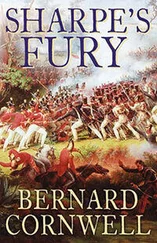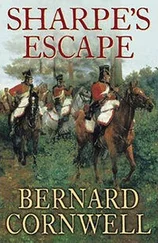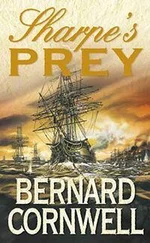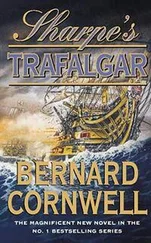Frederickson fumbled with his watch again. “Half past six.”
“It’s cold.” Sharpe seemed to notice the temperature for the first time.
“In an hour,” Frederickson said, “we’ll be breakfasting on chops and pease pudding.”
“You might be.”
“We will be,” Frederickson insisted patiently, then turned to watch a small black carriage which appeared at the foot of the low hill. The coachman whipped the horses up the rutted earth track, then steered towards the bent pine trees where he stopped with a clatter of trace chains and squealing brake blocks. Sergeant Harper, looking indecently cheerful, unfolded himself from the cramped interior and offered Sharpe a confident grin. “Good morning, sir! A bit chilly.”
“Morning, Sergeant.”
“I’ve got the bugger, sir.” Harper gestured at a black-dressed man who had shared the coach.
“Good morning, Doctor,” Sharpe said politely.
The doctor ignored the greeting. He was a thin elderly Frenchman who stayed inside the small carriage. He had a black bag which doubtless contained knives, bonesaws, gouges and clamps. The doctor had been reluctant to come to this dawn slaughter, which was why Frederickson had charged Harper with the duty of making sure the man was up and ready. No British doctor, cither of the Navy or Army, had been willing to serve at this illegal ceremony which could well lead to courts-martial for everyone involved.
“He was drunk last night, sir.” Harper, wearing a Rifleman’s green jacket as faded as either Sharpe’s or Frederickson’s, confided to Sharpe.
“Who was drunk? The doctor?”
“No, sir. Captain Bampfylde was drunk. He stayed ashore, you see, and I saw him in the yard of that big inn back of the ropcwalk.” Harper laughed with a scornful pleasure. “Pissed as a bishop, he was. He’s as twitchy as a cat, I reckon.”
“I’m nervous, too,” Sharpe snapped. “I hardly slept last night.” Or the night before, because the anticipation of this duel had kept him awake as he tried to foresee what might happen in this cold morning. Now he would discover what was ordained, and the closeness of the discovery only added to the fear. He confessed as much to Harper, and was glad to make the confession, for the big Irishman was Sharpe’s closest friend and a man who had shared all of the battles since Wellington’s army had first landed in Portugal.
“But you weren’t drunk, sir. Bampfylde’s going to have the bloody shakes this morning. They’ll be pouring eggs into him, they will.” Harper, four inches taller than Sharpe’s six feet, seemed amused at the impending confrontation. Harper had no doubt that Sharpe would despatch Captain Bampfylde’s loathsome soul to eternal damnation.
And Sharpe had no doubt that Bampfylde deserved such a fate. Bampfylde was a Naval officer, Captain of the great Vengeance which was anchored in the outer roads, and, just weeks before, he had led an expedition north to capture a French coastal fort. Sharpe had been the senior land officer and, once the fort was captured, Sharpe had marched inland to ambush the French supply road. He had returned to the captured Teste de Buch fort to find Bampfylde gone. Sharpe, with two companies of Riflemen and a force of Marines, had been stranded in the fort, where he had been besieged by a French brigade led by a General called Calvet. By the grace of God, the luck of the Rifles, and the help of an American privateer, Sharpe had saved his men. But not all of them; too many had died in the fort, and Bampfylde was to blame. Sharpe, returning from the savagery of the battle against Calvet, and lethal with indignation, had challenged the Naval officer to this confrontation. “I wish we were fighting with swords.”
“Swords or guns, who cares?” Harper said blithely.
“I care.”
“He’s a dead bastard either way.”
“He’s a late bastard.” Frederickson swung his arms to generate warmth, then, apparently oblivious to the gnawing tensions in Sharpe, asked Harper if the company was ready to march.
“Aye, sir.”
“Good.” For as soon as this duel was fought, Frederickson would take his prime company of the 60th Rifles eastwards to join the army. Sergeant Harper would go with Frederickson for, just like Sharpe, he had become detached from his old battalion. That battalion, the Prince of Wales’s Own Volunteers, had a new Colonel who had appointed his own Majors and a new Regimental Sergeant-Major, which had left Sharpe and Harper adrift.
Harper had been eagerly recruited by Frederickson who, in turn, had been just as eagerly snapped up by Major-General Nairn, a Scotsman who at long last had been given his own fighting brigade and wanted Frederickson’s men to add a lethal sting to his skirmish line. Nairn also wanted Sharpe, not for the skirmish line, but to be his chief of staff.
“But I’ve never been a staff officer,” Sharpe had protested.
“I’ve never commanded a brigade before,” Nairn had replied cheerfully.
“I must talk with Jane,” Sharpe had said, and had then gone back to his lodgings where he broke a week’s chill silence, but their discussion about Nairn’s offer had been no happier than the tearful, rage-shredding arguments about the duel. Jane still insisted that they go home, and this time added a new reason for Sharpe to desert the army. Once peace came, she averred, the price of property in England would rise steeply, which made it all the more sensible to sail home now and find a London house. Sharpe had violently protested at such a notion, claiming that he would never live in London; that it was a vile, dirty, crowded and corrupt city, and while he was not averse to buying a house, that house should be in the country. For no very good reason he wanted to live in Dorset. Someone had once extolled that county, and the idea had lodged irreversibly in his head.
In the end, exhausted by the arguments, a reluctant compromise had been agreed. Jane would go home to take advantage of the existing prices of property, but she would seek a country house in Dorset. In the meantime, and if he survived the duel, Sharpe would serve Major-General Nairn.
“But why?” Jane had pleaded tearfully. “You said yourself you feared fighting more battles. You can’t fight and live for ever!” But Sharpe could not really tell her why he refused to go home before the war’s ending. He certainly did not want to be a staff officer, and he readily acknowledged his reluctance to face more battles, but there was a deeper reason that fought those urges and which tugged at his soul like a dark and torrential current. His friends would be in Nairn’s brigade; Nairn himself, Frederickson, and Harper, So many friends had died, and so few were left, and Sharpe knew he would never forgive himself if he deserted those good friends in the last weeks of a long war. So he would stay and fight. But first he would kill a Naval officer, or else be killed himself.
“I spy the bastards,” Frederickson said happily.
Three horsemen were spurring along the road from the town. All wore dark blue naval cloaks and had fore-and-aft cocked hats. Sharpe looked past the three Naval officers to see if any mounted provosts were riding from the town to stop the duel and arrest the participants. The duel was not exactly a secret, indeed half the depot officers in St Jean de Luz had wished Sharpe luck, so he could only assume that the provosts had chosen to be deaf and blind to the duel’s illegality.
The Naval officers walked their horses up the hill and, without an apparent glance at Sharpe, dismounted fifty yards away. One of the officers held the horses’ reins, one paced nervously, while the third walked towards the three Riflemen.
Frederickson, who was Sharpe’s second, went to meet the approaching Naval officer. “Good morning, Lieutenant!”
Читать дальше






